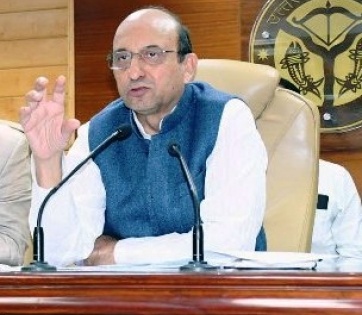UP govt urges CDRI to carry out genome sequencing
By IANS | Published: June 2, 2021 02:15 PM2021-06-02T14:15:03+5:302021-06-02T16:05:23+5:30
Lucknow, June 2 The Uttar Pradesh government has urged the Central Drug Research Institute (CDRI) to carry out ...

UP govt urges CDRI to carry out genome sequencing
Lucknow, June 2 The Uttar Pradesh government has urged the Central Drug Research Institute (CDRI) to carry out studies on genome sequencing and use the results of the study to prepare better for handling the pandemic situation in the future.
UP Health Minister Jai Pratap Singh said that the health department would be carrying out genome sequencing of 10 per cent of all positive samples, which would be picked up from districts where the number of cases continues to remain high.
"We have carried out a similar exercise in the first wave as well, where 10 per cent of the samples were picked up for genome sequencing. Now, because of the massive spread of the virus, we need to make sure that the virus has not mutated or if it has, then the government needs to keep abreast of any changes and ensure that if there is any sequence of concern, then we have it on record," the Minister said.
Currently, the King George Medical University carries out genome sequencing in the state.
Genome sequencing is figuring out the order of DNA nucleotides, or bases, in a genome-the order of As, Cs, Gs, and Ts that make up an organism's DNA. The human genome is made up of over 3 billion of these genetic letters.
It is the most unbiased method to sequence the genome as it does not include a capture of specific targeted regions to prepare the library for sequencing.
The resulting sequence data will include coding and noncoding regions, such as introns, promoters, and regulatory sequences.
Thus, the amount of information that can be obtained is vastly larger than from exome sequencing, but challenges of classifying and interpreting variants are also amplified.
It can often be difficult to prove by bioinformatics interpretation and complementary functional assays whether detected variants in the noncoding fraction of the genome are pathogenic.
Meanwhile, the Minister said that the state would also be getting a sero survey conducted in the state to determine how many people would have already been infected by the Corona virus.
"The government will be able to determine the percentage of infection in the population, collated on the basis of gender and age. We are expecting the results of the survey to be in by the end of June," he said.
Disclaimer: This post has been auto-published from an agency feed without any modifications to the text and has not been reviewed by an editor
Open in app